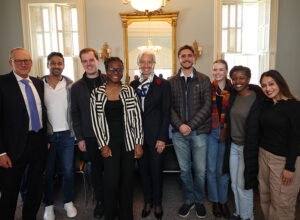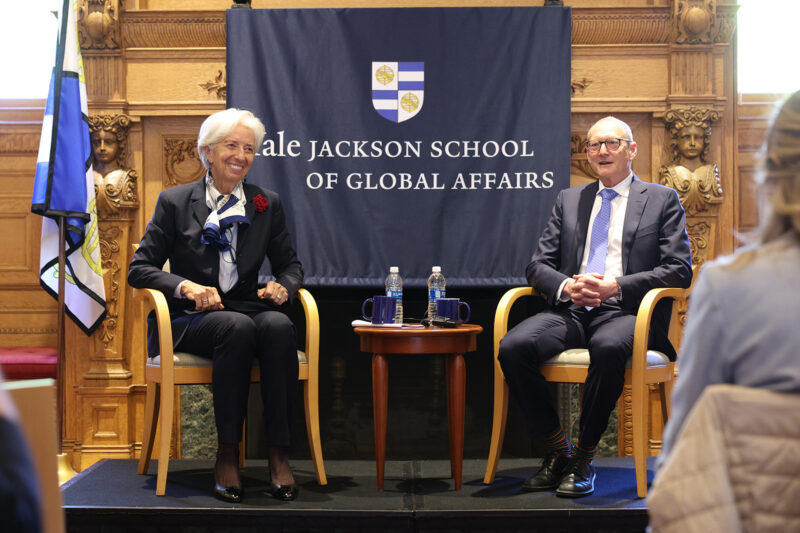Christine Lagarde, president of the European Central Bank, visited the Jackson School on April 22.
On April 22, the Jackson School hosted Christine Lagarde, president of the European Central Bank, for a lecture and Q&A moderated by Dean Jim Levinsohn.
Before becoming president of the European Central Bank in 2019, Lagarde served as managing director of the International Monetary Fund from 2011 to 2019. Prior to that she served as French minister of economy and finance from 2007 to 2011, having been trade secretary from 2005 to 2007. A lawyer by background, she practiced for more than 20 years with international law firm Baker McKenzie.
In her remarks, Lagarde emphasized the importance of ideas in driving economic growth, and the conditions that have needed to be in place – throughout history – for ideas to translate into broad prosperity.
“By inspiring action, ideas can help us grow,” Lagarde said.
While ideas drive growth, we must create the conditions that will allow them to reach their full potential, she explained, citing the example of the printing press as an idea that “revolutionized our world,” but whose ultimate benefits were dependent on rising literacy rates in the years that followed Gutenberg’s invention.
Good ideas must be diffused through the economy in order to achieve scale, Lagarde said, referencing the period when the U.S. was comprised of 13 disparate colonies, which were then brought together into a nationalized economy via the Commerce Clause in the U.S. Constitution.
Shifting to the European continent, Lagarde underscored the need to create a financial system that is conducive to the development of ideas. For example, there are many young, innovative companies in the tech sector in Europe, but fewer options for venture capital and private equity financing than in the U.S. Consequently, some of these companies “go overseas for funding and take their ideas with them,” she said.

Another challenge for Europe is its lack of natural resources, including rare-earth metals critical to the tech sector and oil—a situation further complicated by the war in Ukraine and sanctions against Russia. “We may not have oil, but we have ideas,” Lagarde quipped, referencing a popular French saying.
Lagarde also emphasized the importance of ambition: “we need our leaders to be more ambitious,” she said, pointing to the post-WWII period during which Europe built common supply chains, creating “a progressively united continent that had been torn apart by two world wars.”
In closing, she offered advice to students facing an uncertain economic future with many challenges: “Sometimes you have to be a little bit bold.”
Lagarde’s campus visit also included meetings with students and faculty from the School of Management’s Program on Financial Stability and Yale President Peter Salovey.
